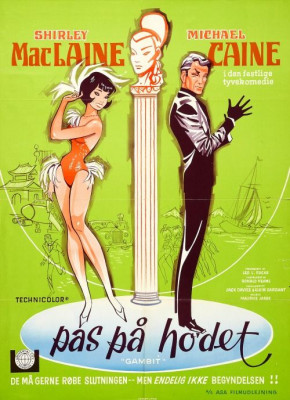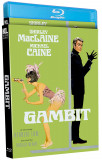| Reviews & Columns |
|
Reviews DVD TV on DVD Blu-ray 4K UHD International DVDs In Theaters Reviews by Studio Video Games Features Collector Series DVDs Easter Egg Database Interviews DVD Talk Radio Feature Articles Columns Anime Talk DVD Savant Horror DVDs The M.O.D. Squad Art House HD Talk Silent DVD
|
DVD Talk Forum |
|
|
| Resources |
|
DVD Price Search Customer Service #'s RCE Info Links |
|
Columns
|
|
|
Gambit (Special Edition)
Gambit (1966), Michael Caine's first Hollywood film after establishing himself as a leading man in British films such as Zulu (1964) and The Ipcress File (1965), is a mostly very entertaining, lighthearted heist film, partly built around an unusual gimmick. Directed by Ronald Neame and co-starring Shirley MacLaine, it's just about the last major American studio film able to get away with exotic foreign locales recreated on backlot streets and Hollywood soundstages. Its inventive script by Jack Davies and Alvin Sargent helps, as does a fine supporting performance by Herbert Lom in one of his best film roles.
The clever ads urged moviegoers, "Go ahead, tell the end but please don't tell the beginning!" This only makes sense when you see Gambit, but since it's hard to describe the plot without spoiling the beginning take note: if you've not yet seen it you might want to stop reading here.
In Hong Kong, professional thief Harry Tristan Dean (Caine) and sculptor associate Emile Fournier (John Abbott) decide to hire Eurasian dancer Nicole Chang (MacLaine) for their latest elaborate and most ambitious heist. She's chosen for her incredible resemblance to the late wife of reclusive Arab billionaire Ahmad Shahbandar (Lom), a lost love he keeps near in the form of a priceless Chinese statue also coincidentally resembling her.
The three fly to the unnamed Arabian country where the Shahbandar resides, his minions immediately noticing Nicole's uncanny resemblance to the late wife, prompting an invitation to Harry and Nicole (masquerading as wealthy husband and wife) to Shahbandar's apartment where, later that evening, Harry ingeniously but effortlessly steal the priceless statue.
All this encompasses the first 30 minutes of Gambit, during which MacLaine never once speaks. Ah, but this turns out to be Harry's imagined plan for the caper. The narrative shifts back to the Hong Kong nightclub just prior to Harry approaching Nicole and, from there, nothing goes according to Harry's plans.
The contrast between how Harry imagines the heist will unfold and how it actually does is part but by no means all the fun of Gambit. Nevertheless, one of the interesting qualities of the film is how, especially for a 1966 Hollywood movie, it contrasts Harry's vision of Shahbandar and his apartment, a Hollywood-imaged Arab stereotype like something out of a Jon Hall-Maria Montez film (though not quite that extreme), and what it turns out to be in "reality": he dressed in finely-tailored suits and obsessed with high-tech gadgetry. Lom himself had long been typed playing exotic foreigners, and he's excellent playing both extremes of the same character.
Michael Caine had been playing mostly uncredited bit parts in British films as late as 1963's The Wrong Arm of the Law (1963) when producer-star Stanley Baker took a chance casting Caine as the co-lead of Zulu, ironically with the Cockney Caine playing an elite-class Englishman. The Ipcress File followed the next year, with Caine hitting yet another homerun earlier in 1966 with Alfie, which solidified his stardom in Britain. Gambit was originally conceived for Cary Grant (retired by 1966), but MacLaine had been impressed by Caine in Ipcress and suggested him.
MacLaine is expectedly charming but Caine is superb, shrewdly underplaying for nearly the entire film, he giving one of those unblinking, placid- and poker-faced performances that enhances the film's humor. Another actor would have been tempted into playing Harry in the opposite direction, making for a very different film.
Director Ronald Neame's incredible career stretched back to the late silent era, when he worked as a cinematographer for Alfred Hitchcock, among others, before partnering for a number of projects with David Lean with Neame acting as a producer and screenwriter, notably Great Expectations (1946), one of the greatest of all British films. Neame became a director himself in the early 1950s, his best film from this period being Tunes of Glory (1960). Soon after he became involved with American and American-British productions with mixed success, rebounding in a big way as the director of The Poseidon Adventure (1972) and later still finding smaller scale success with actor Walter Matthau on Hopscotch (1980) and First Monday in October (1981). He died in 2010 at age 99. On the (archival) commentary track for Gambit Neame is needlessly apologetic about the film's dated aspects but full of praise for Michael Caine especially. Neame appreciated great actors and by all accounts this affection and respect was returned by his casts.
Universal enjoyed considerable success with the Stanley Donen film Charade (1963) and for the next 6-7 years repeatedly emulated its basic qualities hoping lightning would strike twice. At the same time, they hedged their bets with Gambit: MacLaine was a star but not a huge one and Caine was an unknown quantity. They filmed it in less-expensive Techniscope and, despite the script's globetrotting, did all the first-unit shooting with the leading actors on Universal's soundstages and backlot, sending only a second unit to foreign locales, and even that was kept to a minimum. Other than Neame and music composer Maurice Jarre, most of the behind-the-scenes talent was in-house, such as cinematographer Clifford Stine, who was usually relegated to the special effects department, and generally worked as director of photography only on Universal's lesser programmers.
Despite all this, Gambit still plays well today. Caine and MacLaine have good chemistry, and Lom is especially good opposite both leads. The script isn't ingenious but it is agreeably clever, and Neame's sure hand throughout give it a polish that charms throughout.
Video & Audio
Kino's excellent 4K remastered transfer of Gambit presents the 2-perf 2.35:1 Techniscope form in the best possible light. The image is sharp with only modest grain and with strong color. The DTS-HD Master Audio (2.0 mono) is likewise strong. Optional English subtitles are provided on this Region "A" disc.
Extra Features
Supplements include two commentary tracks, the older one with Neame (moderated by David Gregory) and a brand-new one with critics Howard S. Berger, Nathaniel Thompson, and Sergio Mims. Also included is a trailer.
Parting Thoughts
A good movie marking actor Michael Caine's fine Hollywood debut Gambit is Highly Recommended.
Stuart Galbraith IV is the Kyoto-based film historian largely absent from reviewing these days while he restores a 200-year-old Japanese farmhouse.
|
| Popular Reviews |
| Sponsored Links |
|
|
| Sponsored Links |
|
|
| Release List | Reviews | Shop | Newsletter | Forum | DVD Giveaways | Blu-Ray | Advertise |
|
Copyright 2024 DVDTalk.com All Rights Reserved. Legal Info, Privacy Policy, Terms of Use,
Manage Preferences,
Your Privacy Choices | |||||||














